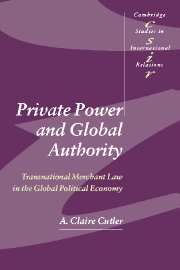Book contents
- Frontmatter
- Contents
- Acknowledgments
- Acronyms and abbreviations
- 1 Introduction
- 2 Conceptualizing the role of law in the global political economy
- 3 Theorizing the role of law in the global political economy
- 4 Medieval lex mercatoria
- 5 State-building: constituting the public sphere and disembedding the private sphere
- 6 The modern law merchant and the mercatocracy
- 7 Conclusion: Transnational merchant law and global authority: a crisis of legitimacy
- References
- Cases cited
- International treaties and United Nations documents
- Index
- CAMBRIDGE STUDIES IN INTERNATIONAL RELATIONS
6 - The modern law merchant and the mercatocracy
Published online by Cambridge University Press: 01 March 2010
- Frontmatter
- Contents
- Acknowledgments
- Acronyms and abbreviations
- 1 Introduction
- 2 Conceptualizing the role of law in the global political economy
- 3 Theorizing the role of law in the global political economy
- 4 Medieval lex mercatoria
- 5 State-building: constituting the public sphere and disembedding the private sphere
- 6 The modern law merchant and the mercatocracy
- 7 Conclusion: Transnational merchant law and global authority: a crisis of legitimacy
- References
- Cases cited
- International treaties and United Nations documents
- Index
- CAMBRIDGE STUDIES IN INTERNATIONAL RELATIONS
Summary
The third phase in the evolution of the law merchant, the twentieth century, is said to be witnessing a revival of the law merchant and the “medieval internationalism” of the first phase (Schmitthoff, 1961: 139–40). Known as “global capital's own law” (Santos, 1995: 288), the law merchant is being revived as an integral force in the “hyperliberalization” of the state and world order. The “hyperliberal” state, “reasserts the separation of the state and economy” (Cox, 1996 b: 201), reinscribing distinctions between politics and economics and the public and private spheres through an intensification of juridified, privatized, and pluralized commercial relations. However, this marks a qualitatively new process of juridification because it is associated with transnationalized social forces (Cox, 1987: 357–9) and the “transnationalization of the legal field” (Santos,1995: 276). Whereas earlier juridification occurred through the processes of state-building and national capital accumulation, contemporary juridified relations are being deepened and intensified through delocalizing and transnationalizing legal disciplines that both reflect and facilitate the transnational expansion of capitalism and related practices of competition states and patterns of flexible accumulation. Moreover, contemporary juridification is intensifying the relationship between law and capitalism through processes that are more aptly described as “reregulatory” rather than “deregulatory,” for the state plays an integralal although different role in regulating international commerce.
At the heart of these transformations is the global mercatocracy, an elite association of public and private organizations engaged in the unification and globalization of transnational merchant law.
- Type
- Chapter
- Information
- Private Power and Global AuthorityTransnational Merchant Law in the Global Political Economy, pp. 180 - 240Publisher: Cambridge University PressPrint publication year: 2003



